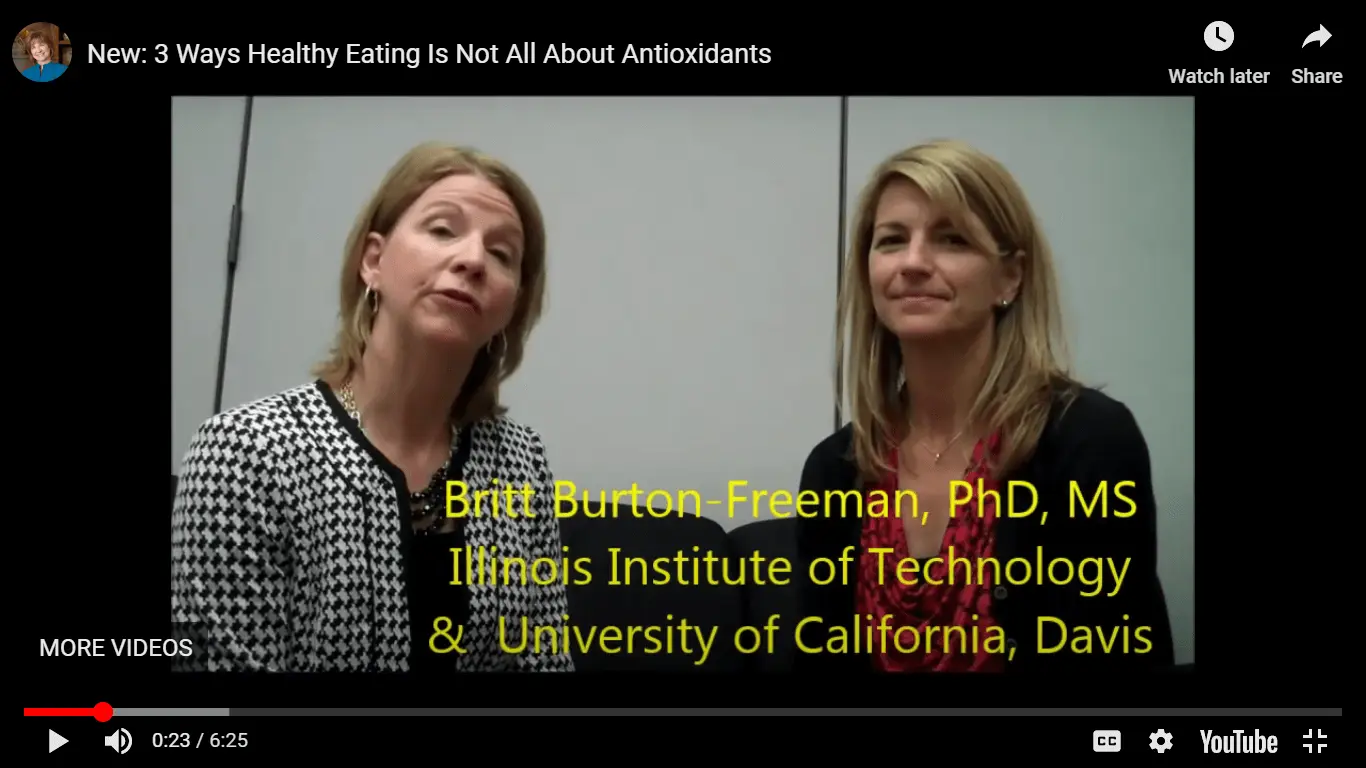
3 Reasons to Think Beyond Antioxidants for Healthy Eating
If maximizing the number of foods with high antioxidant scores isn’t the goal for a healthy diet, what is? And do all those phytochemical compounds in vegetables, fruits and whole grains really matter if they don’t work as antioxidants in our bodies?
In Part 1 of my video interview with Britt Burton-Freeman, PhD, MS, a researcher studying how these phytochemicals can work to promote health, explained why we no longer focus on them as antioxidants per se. Here, in part 2 of our conversation, she shares what we’ve learned about how these compounds in plant foods seem to work. Dr. Burton-Freeman is Director of the Center for Nutrition Research at the Institute for Food Safety and Health, Illinois Institute of Technology; and Associate Researcher in the Department of Nutrition at the University of California, Davis.
Compounds formerly of interest as antioxidants are of more interest than ever for potential roles in promoting health and reducing risk of chronic disease. After you view the video, read on for further explanation.
In this section of our conversation, Dr. Burton-Freeman shared three ways that phytochemicals in fruits, vegetables, whole grains, beans and nuts may promote health without acting as antioxidants. These are not the only ways these compounds may be health-protective – several others are under study as well. However, these three are important areas worthy of attention, and outside what we often think of making our eating choices healthful ones.
Blood Pressure Control Beyond Sodium
The balance of sodium and potassium in the diet has a strong influence on blood pressure. One reason that including plenty of vegetables and fruits is so heart-healthy is that the potassium they provide counter-balances the blood pressure-raising effects of sodium. However, compounds known as polyphenols that you get from fruits, vegetables and other plant foods and drinks seems to act through a completely different mechanism to help control blood pressure.
The layer of cells that line blood vessels is the “endothelium”. Some compounds in these cells can lead to constriction of blood vessels, which leads to increased blood pressure. Other compounds relax the blood vessels, leading to more unrestricted blood flow and reduced blood pressure. The key to health is the proper balance of these “vasoconstricting” and “vasodilating” influences. If excess constriction continues over time, low-level inflammation and clot formation can develop, initiating one of the early steps in atherosclerosis (“hardening of the arteries” leading to heart disease).
- Laboratory studies suggest that polyphenol compounds in food may turn on cell signaling paths that increase production of the compound (nitric oxide) that stimulates these blood vessels to relax.
- Short-term trials in people, that measure blood flow using a special ultrasound technique, show that within a few hours of consuming a berry-based drink, flavonoid compounds from cocoa and chocolate or other flavonoids from green or black tea, blood flow markedly increases – a good sign for heart health.
- Other studies show that several weeks of daily consumption of these foods, as well as walnuts and some other plant foods, seems to promote healthy blood vessel function.
Cholesterol Beyond LDL Count
First we learned that much more than total cholesterol, heart disease risk is related to high levels of LDL cholesterol (which became known as “bad cholesterol”) and low levels of HDL cholesterol (“good cholesterol”). Now we know that LDL occur in several sizes, and apparently, it is mainly small, dense LDL that pose heart disease risk. They can most easily penetrate into artery walls and are most easily oxidized to a form that creates damage and promotes inflammation. Larger LDL particles may not pose risk.
- Among men without heart disease or diabetes who were followed for five to six years, men who started with highest level of oxidized LDL were much more likely to develop heart disease.
- Several human studies lasting a few weeks have found that daily consumption of berry products reduced oxidized LDL about 30%.
Insulin Levels Beyond Carbs and Fiber
Most people think of insulin mainly as the hormone that controls blood sugar levels by triggering its transport into muscle and other cells. When insulin resistance develops, cells become less sensitive to insulin, and the body secretes more and more insulin trying to control blood sugar. Elevated levels of insulin in the blood (hyperinsulinemia) stemming from insulin resistance may exist for many years before diabetes develops, and it may have far-ranging effects even in those years. It leads to changes in blood lipids that promote heart disease, and seems to trigger signaling pathways in cells that promote growth and reproduction that can promote development of cancer.
- Laboratory studies suggest that polyphenol compounds can trigger cell signaling pathways that promote transport of blood sugar into cells and turn on activation of proteins that trigger cell signals that normalize rates of cell growth and reproduction.
- In one short-term trial, people consuming concentrated berry-based drinks showed insulin sensitivity improved 22%. This means they could maintain healthy blood sugar without excessive insulin. Other studies show similar results with berries and with polyphenol compounds from other sources, such as cocoa.
Bottom line: Scientists are still putting together the pieces of laboratory and human studies to understand how polyphenol and other phytochemicals may promote health without acting as antioxidants. Since the compounds in plant foods are converted to so many other compounds within the body, this is challenging work. Meanwhile we have plenty of good reasons that could explain why plant-focused eating patterns are linked with long-term good health. The evidence so far does not support zeroing in on any particular food or compound, but it does give one more reason it makes sense to eat a wide variety of vegetables, fruits, whole grains, beans, nuts, seeds…and even enjoy tea and unprocessed cocoa (and chocolate in reasonable amounts).
COME BACK for more, when Dr. Burton-Freeman shares some surprises about what research supports as practical steps we can take that are enough to make a difference.
Click here: Subscribe to receive research updates by email so you don’t miss a thing! (And you’ll even get a free thank-you bonus with ideas on healthy snacking choices.)
References
Rodriguez-Mateos A et al. Intake and time dependence of blueberry flavonoid–induced improvements in vascular function: a randomized, controlled, double-blind, crossover intervention study with mechanistic insights into biological activity. Am J Clin Nutr 2013; 98:1179
Shrime MG et al. Flavonoid-Rich Cocoa Consumption Affects Multiple Cardiovascular Risk Factors in a Meta-Analysis of Short-Term Studies. J Nutr 2011; 141(11):1982
Hooper L et al. Flavonoids, flavonoid-rich foods, and cardiovascular risk: a meta-analysis of randomized controlled trials. Am J Clin Nutr. 2008 Jul;88(1):38-50.
Katz DL et al. Effects of walnuts on endothelial function in overweight adults with visceral obesity: a randomized, controlled, crossover trial. J Am Coll Nutr. 2012 Dec;31(6):415-23.
Williams PT et al. Levels of cholesterol in small LDL particles predict atherosclerosis progression and incident CHD in the HDL-Atherosclerosis Treatment Study (HATS). PLoS One. 2013;8(2):e56782.
Meisinger C et al. Plasma oxidized low-density lipoprotein, a strong predictor for acute coronary heart disease events in apparently healthy, middle-aged men from the general population. Circulation. 2005 Aug 2;112(5):651-7.
Basu A et al. Blueberries decrease cardiovascular risk factors in obese men and women with metabolic syndrome. J Nutr. 2010 Sep;140(9):1582-7.
Stull AJ et al. Bioactives in blueberries improve insulin sensitivity in obese, insulin-resistant men and women. J Nutr. 2010 Oct;140(10):1764-8.
McCullough ML et al. Flavonoid intake and cardiovascular disease mortality in a prospective cohort of US adults. Am J Clin Nutr. 2012 Feb;95(2):454-64
1 Comments
Leave a Comment
Published : January 28, 2014 | Last Updated: November 16, 2021
Tagged: antioxidants, Britt Burton-Freeman, healthy diet, healthy eating, heart disease, high blood pressure, insulin resistance, plant-based diet, reducing cancer risk, video interview
Meet the author/educator
I Take Nutrition Science From Daunting to Doable.™
As a registered dietitian nutritionist, one of the most frequent complaints I hear from people — including health professionals — is that they are overwhelmed by the volume of sometimes-conflicting nutrition information.
I believe that when you turn nutrition from daunting to doable, you can transform people's lives.
Accurately translating nutrition science takes training, time and practice. Dietitians have the essential training and knowledge, but there’s only so much time in a day. I delight in helping them conquer “nutrition overwhelm” so they can feel capable and confident as they help others thrive.
I'm a speaker, writer, and nutrition consultant ... and I welcome you to share or comment on posts as part of this community!



[…] 3 Reasons to Think Beyond Antioxidants for Healthy Eating […]